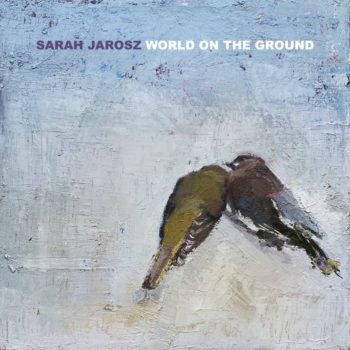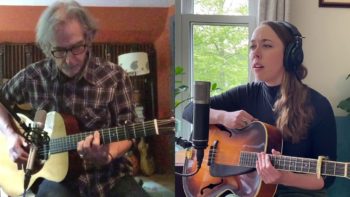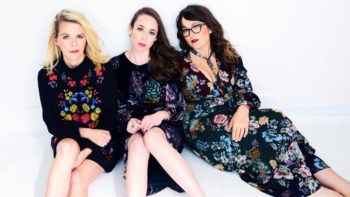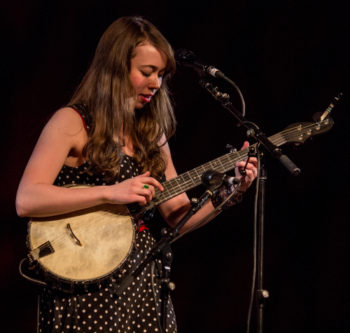Interview: Talking Texas With Sarah Jarosz
Grammy award winning Americana artist Sarah Jarosz has just released her fifth album, World On The Ground.
The accomplished songwriter, singer and fiddle player was born in Austin, Texas but is now based in Nashville. The 13th Floor’s Marty Duda caught up to Sarah on the eve of the release of the new album and found that her Texas roots play a big part of the music she is making now.
Click here to listen to the interview with Sarah Jarosz:
Or, read a transcription of the interview here:
M: Whereabouts are you today?
S: I’m in Nashville, Tennessee.
M: Fantastic. How is things in Nashville?
S: It’s very hot. It’s feeling like summer is upon us.
M: Has Nashville been having any problems with the rioting and the demonstrations and stuff, or is it fairly mellow there?
S: There were some. I got a little bit violent earlier in the week but the last couple of days have been, as far as I know, mostly peaceful protests which is great so thankfully they’re… a lot of people are showing up, but it’s remaining peaceful.
M: Well that’s a relief. It’s pretty scary watching it from the other side of the world here and seeing what’s going on.
S: I’m sure.
M: Have you been locked in and isolated and all that for the virus at the same time?
S: Yeah, I mean I came down here to Nashville, I live in New York City, my apartment is there and all of my stuff is actually still there but I came down here to Nashville. My boyfriend lives down here and is a musician as well and at the beginning of March when it all started…
M: Everyone in Nashville is a musician.
S: Yeah, a lot of them are. But yeah, I’ve been down here pretty much locked-down staying safe as much as I can since the beginning of March.
M: Excellent. And are things getting better?
S: Well the world feels kind of upside down right now to be totally honest. We’re all doing our best I think, it’s kinda wild. I think my general outlook has been to really try to take one day at a time, cause it seems like just each day brings a new challenge right about now so I’m just trying to have this mantra of one day at a time.
M: Gotcha. And so if I’m not mistaken, you’re originally from Texas, is that right?
S: I am yeah. I was born in Austin and grew up in a little town just south of Austin called Wimberly.
M: And why would a musician and songwriter move away from Austin?
S: Well, it’s a good question. I think growing up in Wimberly, which is a very small town when I was living there I think it was about two thousand people. You know, I had that natural kind of thing that most adolescents feel about wherever they’re from which is ‘I gotta get out of here’. So I did that and I went to Boston and studied music at school and then have lived in New York for the last seven years.
 M: So you have a new album out, World On The Ground. How would you compare this to what you’ve done previously? As a kind of initial introduction to folks who may not be familiar.
M: So you have a new album out, World On The Ground. How would you compare this to what you’ve done previously? As a kind of initial introduction to folks who may not be familiar.
S: Well, it’s my first time working with a different producer than my previous four records. My last four albums, I worked with Gary Paczosa and this record I worked with producer John Leventhal who is one of the greats.
M: He is one of the greats. He has a very impressive with former clients and yeah. How did that affect what you ended up coming out with and what was it like working with him?
S: It was fantastic working with him. He was really collaborative and we wound up writing four songs together on the record and then I wrote the rest. In the past where I’ve kind of had a lot of musical guests come in and grace my albums with their presence, John and I pretty much played all the instruments on this record, except for a couple of exceptions. So that was really different and really fun to just sort of dig in and play all this music with John.
M: Right. Well, that’s kind of how he works isn’t it? He tends to kind of get really into the nitty gritty of it and write with the artist and play a lot of the instruments. How was that for you as a different way of working?
S: It was incredible. He has a really great knack for capturing the raw, unjudgemental spirit of an idea or a phrase or a melody when it’s fresh. I think it’s easy in the studio to sort of get in your own head and step up to the mic and feel like it has to be perfect and he was great at just having all the mics up and ready to go and capturing things as they come. It was a very unprecious process in the best way.

M: That’s interesting, cause you think of working with a producer, everything’s gonna be kind of the opposite of that…very kind of ‘this is the way we’re gonna do things’ and all that kind of thing so what it a surprise for you? Is that why you chose to work with him?
S: Well, it was that, what I described, but it was in a very structured format. Like we sort of kept business hours almost where we would work from noon to six or sometimes when you have open ended time in the studio, there can be a lot of wasted time. Having that very strict schedule, I felt like we got so much done. But yeah, I wanted to work with John because of his deep, deep musicianship as a guitar player but also just so many of the records that he’s produced over the years are some of my favourite music in the world.
M: Yeah, they’re excellent. And so, the songwriting. is there a particular thing that holds the songs of the album, that comprise the album together? Or are they kind of separate entities?
S: Well, I think on this album, this idea of home town and a lot of the Texas imagery from where I’m from in Central Texas is definitely tying a lot of these songs together. I had this realisation that I hadn’t really taken time to write about where I’m from before and so you’ll find a lot of that imagery of Central Texas and the hill country through a lot of these songs.
M: There is a song called Home Town isn’t there?
S: There is.
M: Obviously Texas has an amazing musical legacy, blues and country and rock’n’roll and everything in between, what part of that seeps into what you do would you say?
S: I definitely have been really inspired by so many of the Texas singer songwriter, like the Texas singer songwriter tradition is just so rich.
M: That’s true.
S: So many people come to mind, Nanci Griffith and Guy Clark and James McMurtry, Steve Earle, Rodney Crowell, Townes van Zandt, Shawn Colvin, I mean the list is long and all of those people were swirling through my mind when I was writing this album.
M: And what is your writing process like? Do you kind of sit, pull out a piece of paper or get on the computer and just write? Or is it a kind of more drawn out thing for you?
S: Generally it’s more of a drawn out process, kind of collecting little ideas over a long period of time and then sifting back through those ideas and tearing out what works together, melodically and lyrically. But with this record, as I mentioned I wrote four of the songs with John Leventhal and that was a really fun departure for me. On the songs that we wrote together, John wrote all the music and I wrote the lyrics. So that was kind of a cool thing to do and in those instances, the lyrics are usually the thing that take me the longest amount of time and for whatever reason, those songs that I wrote with John, the lyrics came very quickly just because I was so inspired by the music that he was writing.
M: That’s interesting that the music can make that happen for a songwriter and their lyrics.
S: Totally.
M: Which four songs on the album are co-written?
S: So the four are, Pay It No Mind, I’ll Be Gone, Empty Square and Orange and Blue.
M: Orange and Blue is a great title. I don’t know why, it sounds very evocative. What were you thinking when you wrote it?
S: Thank you. The initial image that came to mind when John played me the piano melody was the cypress trees in Wimberly. There’s so many rivers and creeks that run through Wimberly, and one of the creeks, in the middle of town it’s actually called Cypress Creek, just these old, giant roots, these old, beautiful trees, and that was sort of the image that came to mind but then, Orange and Blue being a way to describe a flame, so those were the two main images in that song.
M: And your song Maggie, we do a little radio feature thingy about new music every Friday and we played that, so maybe you can tell me a little bit about that song for folks who have heard it on the thing that we do and want to know more.
S: Yeah, for sure. Maggie is very close to my heart. It was inspired by a chance encounter with an old childhood friend at my ten year high school reunion last summer, last August. I had this conversation with this old friend Maggie and was inspired to write that song, pretty much right after.
M: And what was the reunion like for you ten years? I think I’m due for my fiftieth.
S: It was great, I loved it. I was just glad that I was able to go and the high school reunion was a super positive experience for me because I didn’t think I was initially gonna be able to go, but I had a little window off tour and it really opened my eyes in a lot of ways and was a big thing that made me want to even write about where I’m from in the first place, with this record.
M: And this record, is it the first since 2016? So has it been four years since the previous one?
S: It has yeah. I mean, I made a record with my band I’m With Her in between so there hasn’t been much of a pause really, but it’s my first solo record since Undercurrent in 2016.
M: And how does the stuff that you do with your band differ from your solo thing? Is it more of a singer-songwritery thing compared to rocking out or something?

S: No, no. In many ways it’s actually more stripped down, I’m With Her is more stripped down than my thing, but I mean, the main difference is just that I’m With Her is extremely harmony based. It’s three women, it’s my band with Sarah Watkins and Aoife O’Donovan and there’s a lot of emphasis on harmonies on all the songs and I’ve just had such a wonderful time making music with those women.
M: So when you’re writing those songs, do you think in terms of I have to write for that musical environment as opposed to on your own? Or do the songs just come and you decide afterwards wherever they’re gonna go?
S: I mean, all the music is that band we’ve written completely equally together, but it’s been nice I think in the writing process with Sarah and Aoife, if an idea pops up that doesn’t really feel like it fits or we are having a hard time seeing it through, I think for all of us it’s nice to be able to feel like that’s not the be all end all of our musicality and our creativity and if an idea doesn’t work in that band, it could maybe work somewhere else like in one of our solo things. So it’s sort of that that makes it less precious and less pressure filled because we just get to make the music we want to make together.

M: You also are known for your instrumental prowess as well as singing and songwriting, how do you think of yourself when you think in terms of what you do?
S: I’ve always placed great importance on all the aspects on my musicianship, that’s singing and playing all my instruments and writing. And I think if anything with this record, I tried to place more importance than ever on the songwriting aspect of my musicality because I think in the past I’ve really focused on just trying to be a great instrumentalist. Singing is something I’ve always done but it was cool to really feel like this time it’s all about the songs and just strip away whatever doesn’t serve the song doesn’t have a place here.
M: And I’m sure your producer helped keep you on track as well. Is that part of what he did with you?
S: For sure, I mean, it was actually pretty amazing how on the same page he and I were from the get go. He was just so inspiring and like I said, the ability to not be precious and just try things out in the studio and if it doesn’t work, fine but if it does then we’re recording it and we’re going along. He’s a master, he is like one of the great masters of the art of being a producer and a musician, so I learnt so much.
M: Now, the record has come out in this weird time where all this stuff is happening, especially in the U.S, I assume you’re dying to play live but probably can’t. Do you have any plan looking ahead to the next few months, or are you just waiting out to see what’s happening?
S: You know, there’s a lot of unknowns right now. I can’t really say when I’ll be back on the road at this point. I think nobody really knows when it’s gonna be safe or when people are gonna feel comfortable being in a large crowd in a tight space. But in the meantime, I’m just so glad that this record is finally out because people can still listen to music in their home and their cars. I’m trying to do as much videos online and I’ve done a couple of live streams here and there so it’s just all about being flexible right now and going with the flow.
M: I was kind of frustrated, a lot of people have kind of postponed the release of their album, but for me, I don’t know about anybody else, but it’s a great time to sit around and listen to music because you have more time than I’m used to so it seems like a perfect time to release a record. But there you go, I guess you want to be able to go out and play the songs in front of people as well.
S: Yeah. It’s tough to not be able to do that right now, but as you said, I’m just glad to be releasing it at all. So there you go.
M: Very good. Well hopefully someday you’ll be able to come down to New Zealand and play some for us once we get our borders back open. We’ve beaten the virus, we have I think…
S: I read that the other day.
M: Pretty cool.
S: Congratulations.
M: Once they start allowing people in we’ll be cooking, so there you go.
S: I’ve never been, so I cannot wait to get down there some day.
- Adam Hattaway & The HauntersJuly 25, 2024Wine Cellar (13th Floor Concert Review) - July 26, 2024
- New Music Friday: 13th Floor New Album Picks: July 26, 2024 - July 26, 2024
- Holly Arrowsmith – Blue Dreams(Leather Jacket Records) - July 25, 2024
